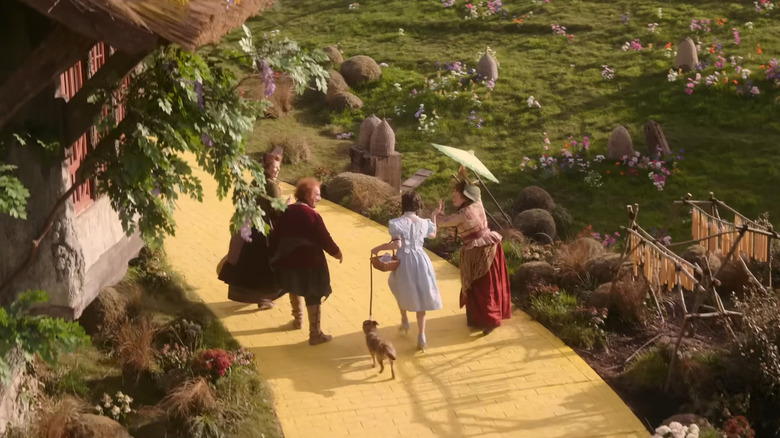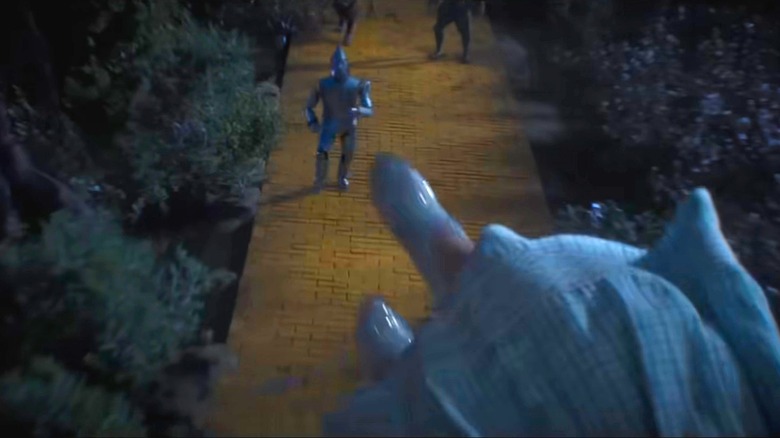Wicked: For Good Has No Idea What To Do With Dorothy, And That's A Big Problem
This article contains spoilers for "Wicked: For Good."
"Wicked: For Good" was always going to have a lot on its plate. The decision to split Stephen Schwartz and Winnie Holzman's 2003 Broadway sensation into two movies was initially met with mixed reception considering the stage play is about three hours long with intermission. The first film in Jon M. Chu's "Wicked" duology teeters right on the edge with a 2 hour and 45 minute runtime, but it felt right for this adaptation. The expansion of act one used the extra time to further build upon the relationship between Elphaba (Cynthia Erivo) and Glinda (Ariana Grande-Butera). It made the swelling high of "Defying Gravity" a well-earned place to leave off since it made you feel you watched an entire movie instead of half of one. You would think that this would give "For Good" even more grace to take its time adapting act two, yet the film weirdly plays like a rushed second half instead of its own movie.
/Film's BJ Colangelo was a lot higher on "For Good" than I was in her review, where she acknowledged the film's faults, yet still felt moved by the end. On top of the film's lack of memorable songs and murky cinematography, I couldn't help but be distracted by its messy plotting at odds with what the first "Wicked" accomplished. There's plenty to talk about here, but I was perhaps most baffled by its usage of Dorothy Gale, the Kansas girl who gets swept up in an adventure to meet the Wizard (Jeff Goldblum). You can already envision the headache on behalf of Chu and company in having to follow-up Judy Garland's portrayal in Victor Fleming's 1939 classic. But what they come up with here exacerbates the issue more than anything else.
Obscuring Dorothy proves to be even more of a distraction
It's about halfway through "For Good" when Madam Morrible (Michelle Yeoh) conjures the house tornado that crushes the tyrannical Nessarose (Marissa Bode) as a means to draw out Elphaba. If you've ever seen anything "Oz"-related, you know that within it resides a very confused Dorothy. But by the time Elphaba arrives in Munchkinland, Glinda has already given away the silver slippers to Dorothy, who's marching her way down the Yellow Brick Road. The next time we see her, she's already speaking with the Wizard's mechanical facade alongside the Tin Man, Cowardly Lion, and the Scarecrow. After a while, it appears that "For Good" has no intention of showing Dorothy from the front, nor giving her any lines, despite being played by UK actress Bethany Weaver. She's not even a character, so much as a narrative obligation.
The Broadway show also keeps Dorothy's presence to a minimum, but that has more to do with condensing much of Gregory Maguire's 1995 novel into a three hour stage production. She's largely offscreen, with her most prominent appearance being in silhouette when she tosses the bucket of water onto Elphaba. But movies are much different beasts than stage productions. The issue I have isn't so much that Dorothy isn't an expanded character even though she's technically an important driving factor of the story and how these characters converge. It's the fact that every attempt to obscure Weaver's face and voice calls even more attention to her specter-like appearance.
The decision plays like Chu wants to withhold her face for a revelation that never comes. Dorothy is an enigma in "For Good," which is strange since her minimal inclusion makes the film feel like it's missing a whole bunch.
Wicked: For Good proves that what works on stage doesn't always work on the screen
"For Good" often feels like someone hit the chapter skip button on the remote every time it suddenly flashes between these large gaps in time where a whole bunch of stuff happened. Prior to Dorothy bringing the house down, Elphaba does her best to course-correct a rogue spell Nessarose made against Boq (Ethan Slater), which ultimately results in him being turned into the Tin Man. We receive yet another origin story for one of the famous "Wizard of Oz" group members, as Elphaba uses the Grimmerie to turn the tortured Fiyero (Jonathan Bailey) into the Scarecrow. Chu spends so much time building up the horrifying transformations of these two characters, yet both are distractingly absent from most of the big developments in the film's third act.
We never get to see how Boq and Fiyero interact alongside Dorothy in this alternative history of "The Wizard of Oz," especially in the big sequence where they douse Elphaba with water in Kiamo Ko castle. It's an attempt to keep things largely focused on Elphaba and Glinda's perspective. However, in not expanding upon Boq's rage, nor Fiyero's conflicted feelings, shielding Dorothy from being an actual character makes their arcs feel unsatisfying within the confines of being an ensemble picture. What may have worked on the stage doesn't always translate well for the screen, especially since it's been proven that expanding the story worked out for Chu the first time around. In "For Good," Dorothy informs everything and nothing at the same time.
"Wicked: For Good" is now playing in theaters nationwide.


